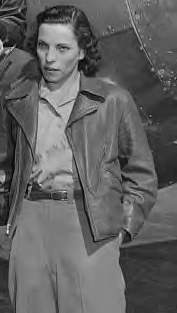Born 14 April 1913 in Scammon,
Kansas, she always dreamed of flying. She attended Kansas State
Teachers' College, Pittsburg, Kansas and then left to get flight
training at Atkinson Municipal Airport, Pittsburg, Kansas. She worked
part-time to pay for the flying lessons and receive her private,
limited commercial and transport licenses. She moved to California
and became a flight instructor for CPT and for Air Activities, Houston
Texas.
In September of 1942, Nancy
Love was appointed as the director of the Women's Auxiliary Flying
Squadron (WAFS) under Major Tunner and given a chance to prove the
skeptics wrong. Nancy initially sent telegrams out to eighty-three of
America's best women pilots recruiting them as civilian pilots serving
in the Ferry Command.
The women had to be between twenty-one and
thirty-five, have logged at least 500 hours in the air, hold a
commercial license, a 200-horsepower engine rating, and have recent
cross-country flying experience. Twenty-seven women met these rigorous
standards and answered the call to serve their country during wartime
and Bernice Batten was one of the Twenty-seven.
|
These twenty-eight women, "The
Originals" as they would come to call themselves, began ferrying light
aircraft and primary trainers such as Stearmans and PT-19 Fairchilds. They
quickly went on to check-out in larger aircraft including pursuit planes
such as the P-38 and P-51. The WAFS merged with Jackie Cochran's program,
the Womens Flying Training Detachment (WFTD) in 1943 to become the Women
Airforce Service Pilots (WASP). Collectively these women surpassed all
expectations and proved that women could fly military aircraft with as much
skill and competency as their male counterparts.
Bernice Batten was assigned to Long Beach Army Air Field, Long Beach,
California. she checked out in BT-13 and started ferrying them from a
factory at Downey to various training bases. She was then sent to Love
Field, Dallas Texas where she ferried the PT-13, AT-6 and the A-24 and had
to "bail out" of an A-24. This made her an elite member of the "Caterpillar
Club" composed solely of those who had been forced to resort to parachutes
in an emergency.
Class: WAFS
Base Assignment: New Castle Army Air Base, Palm Springs Army Air Base,
Merced Army Air Field
Planes Flown: C-47, BT-13, AT-6, A-24
Bernice Batten died July 16,
2004. She was 91. |
